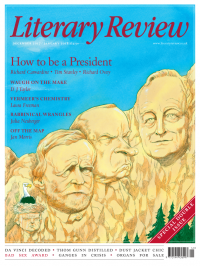Mike Jay
Voracious Assimilator
The River of Conciousness
By Oliver Sacks
Picador 237pp £18.99
As he approached sixty, Oliver Sacks ‘started to experience a curious phenomenon – the spontaneous, unsolicited rising of early memories into [his] mind, memories that had lain dormant for upwards of fifty years’. Over the last twenty years of his life, these memories inspired two hugely popular volumes of autobiography (Uncle Tungsten and On the Move) and a steady flow of shorter pieces for the New York Review of Books. The River of Consciousness includes many of them and is dedicated to Robert Silvers, the NYRB’s late editor, whose openness to their idiosyncratic mix of personal anecdote and panoramic insight, often constructed around obscure episodes in the history of science, enabled this profuse late flowering.
Through these early memories, Sacks discovered the roots of his life’s work in childhood and in play, an activity both imitative and creative that allows children, plant-like, to embed themselves in their surroundings while at the same time pushing outwards into the unknown. In Uncle Tungsten, his childhood fascination

Sign Up to our newsletter
Receive free articles, highlights from the archive, news, details of prizes, and much more.@Lit_Review
Follow Literary Review on Twitter
Twitter Feed
It wasn’t until 1825 that Pepys’s diary became available for the first time. How it was eventually decrypted and published is a story of subterfuge and duplicity.
Kate Loveman tells the tale.
Kate Loveman - Publishing Pepys
Kate Loveman: Publishing Pepys
literaryreview.co.uk
Arthur Christopher Benson was a pillar of the Edwardian establishment. He was supremely well connected. As his newly published diaries reveal, he was also riotously indiscreet.
Piers Brendon compares Benson’s journals to others from the 20th century.
Piers Brendon - Land of Dopes & Tories
Piers Brendon: Land of Dopes & Tories - The Benson Diaries: Selections from the Diary of Arthur Christopher Benson by Eamon Duffy & Ronald Hyam (edd)
literaryreview.co.uk
Of the siblings Gwen and Augustus John, it is Augustus who has commanded most attention from collectors and connoisseurs.
Was he really the finer artist, asks Tanya Harrod, or is it time Gwen emerged from her brother’s shadow?
Tanya Harrod - Cut from the Same Canvas
Tanya Harrod: Cut from the Same Canvas - Artists, Siblings, Visionaries: The Lives and Loves of Gwen and Augustus John by Judith Mackrell
literaryreview.co.uk